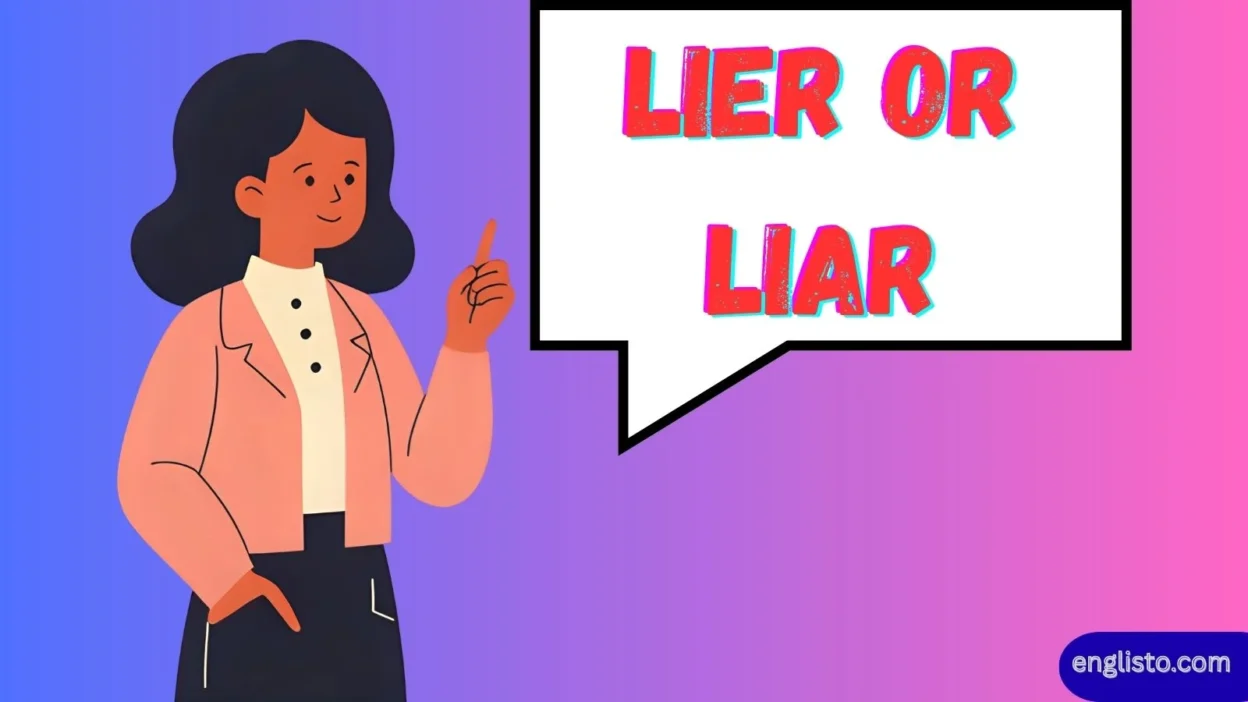The English language is full of quirks, surprises, and traps that often confuse learners and even native speakers. Among these tricky pairs, “lier” and “liar” stand out as words that look almost identical yet mean completely different things. While both share the root verb “lie”, their meanings diverge dramatically depending on context. Lier or Liar.
At first glance, they seem like homophones—words that sound the same but differ in meaning and spelling. However, “lier” is rare, almost archaic in everyday English, whereas “liar” is a common, emotionally charged term you’ll hear daily in conversations, media, and even politics.
This article dives deep into the nuances, spelling differences, history, and practical usage of lier vs. liar. By the end, you’ll be able to distinguish them effortlessly, avoid embarrassing mistakes, and even teach others how to use them correctly.
The Key Difference Between “Lier” and “Liar”
At its core, the distinction is simple:
| Word | Meaning | Usage in a Sentence | Connotation |
| Liar | A person who tells untruths or engages in deception. | The politician was called a liar after evidence of corruption emerged. | Negative |
| Lier | A person or thing that lies down or rests in a horizontal position. | The patient was a lier on the examination table. | Neutral / Rare |
Think of it this way:
- A liar tells lies.
- A lier simply lies down.
Read More: Inspiring vs Inspirational: Understanding the Nuances, Meanings, and Real-Life Usage
The Origins of the Words
Understanding the etymology of these terms sheds light on why they cause so much confusion.
- Liar comes from the Old English leogere, meaning “one who tells untruths.” It’s been around since the 14th century and has always carried a strong negative connotation tied to dishonesty, hypocrisy, and deceit.
- Lier, on the other hand, traces its roots back to the Old French lier meaning “to bind or tie.” Over time, it shifted in meaning and became linked with someone who is lying down or reclining.
Both words are connected to the verb “lie”, but in English, lie itself has two distinct roots:
- Lie (to recline) → gives us lier.
- Lie (to tell a falsehood) → gives us liar.
Why “Lier” is Rarely Used Today
In modern English, lier has become almost obsolete. Most people simply say:
- “The dog is lying on the floor.”
- “The patient is lying on the bed.”
Instead of calling someone a lier, we describe the action with the verb “lie” in progressive form.
The only contexts where “lier” might appear are in:
- Medical settings: The lier was calm during the examination.
- Literary works: Writers like Leigh Hunt (1830) occasionally used “lier” for stylistic effect.
- Archaic or poetic descriptions: Referring to a sunbather as a lier on the beach.
Everyday Usage of “Liar”
Unlike “lier,” the word liar is alive and kicking in everyday communication. It shows up in:
- Personal conversations: “Stop being such a liar!”
- Media and politics: Accusations of dishonesty, corruption, or false statements.
- Pop culture references: Movies, songs, and even idioms like “liar, liar, pants on fire.”
Because it carries such a negative connotation, calling someone a liar can damage relationships, reputations, and trust.
Examples to Clarify Usage
| Sentence | Correct Word | Explanation |
| The boy was caught cheating and called a ___ by his classmates. | Liar | Refers to dishonesty. |
| The exhausted hiker was a ___ on the flat surface of the hill. | Lier | Refers to lying down. |
| She accused her ex-boyfriend of being a compulsive ___. | Liar | Refers to habitual deception. |
| The sunbather was a ___ on the beach all day. | Lier | Refers to resting. |
Mnemonics to Remember the Difference
To avoid misinterpretation, here are quick strategies:
- Liar → Think of the word “lie” + “-ar” = liar, meaning “a teller of lies.”
- Lier → Think of “lie” + “-er” = lier, meaning “one who lies down.”
Or simply:
- If the subject is about truth or falsehood, use liar.
- If the subject is about rest or position, use lier.
Synonyms and Related Terms
Here’s a handy vocabulary boost:
For “liar” (dishonest person):
- Prevaricator
- Perjurer
- Fabricator
- Cheat
- Storyteller (negative context)
- Hypocrite
For “lier” (person lying down):
- Lounger
- Recliner
- Sunbather
- Resting person
- Prostrate figure
Common Confusions and Misspellings
English learners often confuse lier, liar, and even lyre (a stringed instrument).
| Word | Meaning | Example |
| Liar | Dishonest person | He’s a liar, don’t trust him. |
| Lier | One who lies down | The patient was a lier on the bed. |
| Lyre | Ancient stringed instrument | The musician played the lyre in Greece. |
| Lair | Den or hiding place | The bandits hid in their lair. |
Pronunciation Guide
Both “lier” and “liar” are pronounced the same way: /ˈlaɪ.ər/, which sounds like “lie-er.”
- Liar: /ˈlaɪ.ər/ → rhymes with fire and tire.
- Lier: /ˈlaɪ.ər/ → identical sound, which explains much of the confusion.
Because of this identical pronunciation, spelling is crucial for clarity.
Usage in Literature and Culture
- Ralph Bergengren’s The Perfect Gentleman (1919) uses “lier” poetically.
- The idiom “Liar, liar, pants on fire” has been popular with children for decades.
- Characters like Pinocchio became global symbols of liars, with his nose growing each time he told a falsehood.
Practical Tips for Learners
- Use context clues – If the sentence talks about deception, go with liar.
- Check connotation – Neutral tone? Probably lier. Negative? Definitely liar.
- Practice sentences – Build examples to strengthen recognition.
- Use online tools like Grammarly or Merriam-Webster’s dictionary for spelling checks.
- Remember frequency – “Liar” is common; “lier” is rare.
FAQs
What is the plural of “liar”?
The plural is liars: “Politicians are often called liars.”
Is “lier” still used in modern English?
Yes, but it’s rare and mostly limited to medical or poetic contexts.
Can “lier” and “liar” be interchanged?
No. One means “dishonest person,” the other “person lying down.”
Do Americans and British speakers use these words differently?
Both use “liar” commonly. “Lier” is rarely used in either variety.
Why do spell checkers flag “lier”?
Because it’s uncommon, many tools mark it as a possible misspelling.
Conclusion
The difference between “lier” and “liar” is small in spelling but vast in meaning. A liar is someone who deceives, cheats, and spreads untruths—an identity loaded with negativity. A lier, however, is simply someone lying down, neutral and often overlooked.
By mastering this distinction, learners can avoid awkward misunderstandings, communicate with precision, and gain confidence in English. Remember:
- Liar = dishonest person.
- Lier = person lying down.
With practice, examples, and awareness, the confusion between these two words will vanish, leaving you with polished grammar and stronger communication skills.



